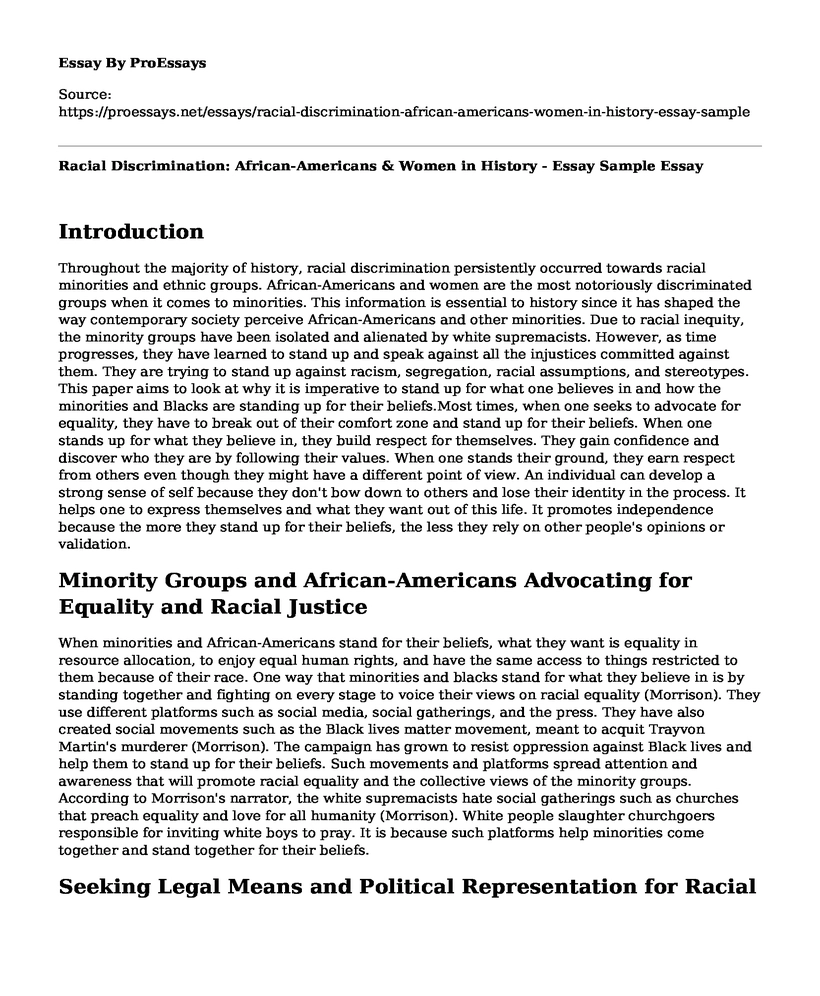Introduction
Throughout the majority of history, racial discrimination persistently occurred towards racial minorities and ethnic groups. African-Americans and women are the most notoriously discriminated groups when it comes to minorities. This information is essential to history since it has shaped the way contemporary society perceive African-Americans and other minorities. Due to racial inequity, the minority groups have been isolated and alienated by white supremacists. However, as time progresses, they have learned to stand up and speak against all the injustices committed against them. They are trying to stand up against racism, segregation, racial assumptions, and stereotypes. This paper aims to look at why it is imperative to stand up for what one believes in and how the minorities and Blacks are standing up for their beliefs.Most times, when one seeks to advocate for equality, they have to break out of their comfort zone and stand up for their beliefs. When one stands up for what they believe in, they build respect for themselves. They gain confidence and discover who they are by following their values. When one stands their ground, they earn respect from others even though they might have a different point of view. An individual can develop a strong sense of self because they don't bow down to others and lose their identity in the process. It helps one to express themselves and what they want out of this life. It promotes independence because the more they stand up for their beliefs, the less they rely on other people's opinions or validation.
Minority Groups and African-Americans Advocating for Equality and Racial Justice
When minorities and African-Americans stand for their beliefs, what they want is equality in resource allocation, to enjoy equal human rights, and have the same access to things restricted to them because of their race. One way that minorities and blacks stand for what they believe in is by standing together and fighting on every stage to voice their views on racial equality (Morrison). They use different platforms such as social media, social gatherings, and the press. They have also created social movements such as the Black lives matter movement, meant to acquit Trayvon Martin's murderer (Morrison). The campaign has grown to resist oppression against Black lives and help them to stand up for their beliefs. Such movements and platforms spread attention and awareness that will promote racial equality and the collective views of the minority groups. According to Morrison's narrator, the white supremacists hate social gatherings such as churches that preach equality and love for all humanity (Morrison). White people slaughter churchgoers responsible for inviting white boys to pray. It is because such platforms help minorities come together and stand together for their beliefs.
Seeking Legal Means and Political Representation for Racial Equality
Minorities stand up for what they believe in through seeking legal means. They are using amendments of the law and post-civil rights legislation to achieve racial equality and enjoy similar human rights just like the whites. They are trying to use the political platform to achieve their dreams and have a voice that can rally for their beliefs. They have resorted to using influential political figures to push for their agendas of equality. According to Morrison's narrator, a Black Lives Matter protester got beaten during President Donald Trump's campaign rally (Morrison). He did not seem to condone the beating. Therefore, voting in leadership that can support their beliefs is one way of the minorities and the blacks standing up for their beliefs.
Conclusion
In conclusion, it is imperative to stand up for what one believes in because it builds confidence. Due to racial inequity, the minority groups have learned to stand up and speak against all the injustices committed against them. They are trying to stand up against racism, segregation, racial assumptions, and stereotypes.
Work Cited
Morrison, Toni. "Making America White Again". The New Yorker, 2020, https://www.newyorker.com/magazine/2016/11/21/making-america-white-again. Accessed 1 May 2020.
Cite this page
Racial Discrimination: African-Americans & Women in History - Essay Sample. (2023, Jun 07). Retrieved from https://proessays.net/essays/racial-discrimination-african-americans-women-in-history-essay-sample
If you are the original author of this essay and no longer wish to have it published on the ProEssays website, please click below to request its removal:
- On the Duty of Civil Disobedience - Essay Analysis
- Research Paper on Pediatric Obesity: Causes, Symptoms, Prevention and Treatment
- Essay Sample on Violence and Terror on the Southwest Border
- Article Analysis Essay on "Accidents on the Road"
- Moralistic Reasoning on Gender Issues: Leading Cause of Social Problems - Essay Sample
- Free Essay Example on Gun Violence in America: An Alarming Reality
- Post Civil War Life - Essay Example







